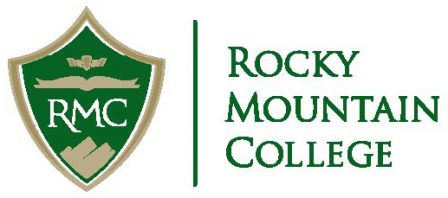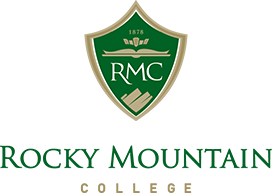Transfer and Nontraditional Credits
April 27, 2022 2024-02-28 0:10Transfer and Nontraditional Credits
Transfer Credit
- Credits from coursework completed at accredited U.S. and international colleges
- Dual-Enrollment credit (with official college transcript)
Prospective and Incoming Students
Transfer students interested in applying may contact Sean Coleman, Transfer Coordinator, 406.657.1092/ colemans@rocky.edu to request a transcript analysis. Prospective first-year students with dual-enrollment or other types of college credits, contact Admissions.
General Policies
- Transfer credits are posted during the student's first semester of attendance.
- The Office of Student Records will make the final evaluation regarding how transfer work applies to core curriculum and general degree requirements after receipt of all final official college transcripts.
- Only coursework with D- (or P) grades or better will transfer: no W or F grades or preparatory (below 100-level) courses are accepted.
- Current students may request pre-approval for summer transfer course work to count for core curriculum requirements. Contact Office of Student Records for more information.
- See course catalog for transfer credit policies and general degree requirements.
Nontraditional Credit
- AP (Advanced Placement) Exam Credit
- IB (International Baccalaureate)
- CLEP and DANTES
- Military (non-ROTC) Credit
- Challenge of a Course
- Credit for Prior Learning
General Policies
- Nontraditional credit is posted to the student's transcript after successful completion of one semester of full-time enrollment.
- Nontraditional credit is awarded with a grade of “P.”
- Students may apply for nontraditional credit up to the end of their second term of attendance at Rocky Mountain College for work completed prior to enrolling at the College.
- If the credit was granted via an exam, official scores must be sent to Rocky Mountain College.
- Nontraditional credits are not accepted in transfer from another institution.
- Nontraditional credit may apply to no more than 30 semester hours for a baccalaureate degree or 15 semester hours for an associates degree.
- As a general policy, nontraditional credit will not be granted for work done while enrolled at RMC.
Advanced Placement Program (AP Credits)
Rocky Mountain College welcomes Advanced Placement (AP) test scores and awards credit for students who meet the minimum score requirements.
AP Scores
- RMC follows the American Council on Education (ACE) guidelines for awarding AP credit (minimum exam score of 3), with the exception that a minimum score of 4 is required for the following: English Language and Composition, English Literature and Composition, and Computer Science.
- AP exam scores should be sent directly to Rocky Mountain College (school code 4660) from College Board/AP (https://apstudent.collegeboard.org/home).
AP Credits for Core Requirements
- Students may use AP credits to meet core curriculum requirements (general education), with the exception of AP Math, English, and Computer Science credits, which count as general elective credit. AP credits that do not correspond to a core requirement may also count as elective credit.
- AP elective credits may be included in the total number of credits required for graduation and can reduce the number of courses a student needs to take while in college.
- AP credit requires approval of the department to count for a major or minor requirement. Students in the sciences typically take introductory science courses at RMC even if they have AP credit. In these situations, the AP course may count as general elective credit.
- Download the RMC AP Credit-Granting Policy (pdf) to see how AP credit applies toward core curriculum (general education) requirements.
Evaluation and Posting of AP Credits
- AP credits are not assigned to a specific RMC course. AP credits are recorded on the student’s transcript as AP Biology, AP Psychology, etc. This allows the student to transfer in the total amount of credits earned (typically 3-8 credits, depending on the subject and length of the course). If the student takes a similar course at RMC, the AP credits may still count toward the total number of credits required for graduation.
- AP Credit is awarded after the student has successfully completed one semester at RMC and may not be used to fulfill program or placement requirements in math or English. Faculty approval is required to apply AP credit toward requirements in a major or minor.
- Email Office of Student Records to request a list of AP exams, scores, and core requirements that may be fulfilled via AP exam.
International Baccalaureate Program
Rocky Mountain College recognizes the standards set by the International Baccalaureate Program for awarding college credit. Contact the Office of Student Records for more information on how IB credits transfer to RMC.
CLEP and DANTES
Rocky Mountain College recognizes, for college credit, successful completion of the general examination or subject examinations of the College Level Examination Program (CLEP). Credit may also be earned through the Defense Activity for Traditional Educational Support (DANTES) program. Any CLEP or DANTES examinations for credit must be completed by the end of the second semester of enrollment at Rocky Mountain College and exam scores sent to RMC.
Credit for Military Experience and Training (non-ROTC coursework)
Credit is evaluated based on the American Council on Education (ACE) recommendations for credit for military experience. Students should submit their information to ACE for evaluation.
Incoming students may have military transcripts sent to Rocky Mountain College.The Office of Student Records will evaluate the ACE recommendations and make determinations about which credits will transfer to Rocky Mountain College and how those credits will count toward graduation requirements. Military credits are processed after traditional credits have been evaluated and posted.
Challenge of a Course
Students may challenge courses not previously taken. Approval of the faculty in the discipline and the academic vice president must be obtained, and written notification of successful challenge must be filed with the Office of Student Records. A challenge of a course involves a process whereby faculty members can effectively evaluate the student’s knowledge and skills in the content areas. Examples of methods faculty may use to evaluate a challenge include exams, having the student write a paper or give a presentation, and/or having the student demonstrate skills in relevant activities.
Credit for Prior Learning: Portfolio
This category of nontraditional credit is only appropriate under restricted and unusual circumstances. It applies to situations where students can document college-level learning in disciplines for which there is no corresponding course to challenge at Rocky Mountain College or any appropriate external examination, such as CLEP or DANTES.
The Academic Standards Committee is responsible for making final decisions about the granting of credit for prior learning; those decisions are typically made after consultation with appropriate faculty from within the College when available, or from other colleges if necessary. To earn academic credit, students are required to provide sufficient evidence to demonstrate that their learning outside of the classroom is equivalent to the content of an academic course. Evidence is presented in the form of a portfolio and typically includes performance tests, essay examinations, and samples of student work. Interviews with faculty or outside experts may also be appropriate.
There is a fee of $200 for the development and evaluation of the portfolio.
Contact
Office of Student Records
Rocky Mountain College
Prescott Hall
1511 Poly Drive
Billings, MT 59102


